For such a stereotypically cultureless place, the United States sure has a lot of cultures in it. Disregarding the 90% of the country where tractor tires flank the entrance to the dirt path that takes you to the house’s parking lot (the lawn), where Judge Judy is La Traviata and Budweiser is a foaming glass of Dom P (except nobody uses glasses for Bud), the average American major city is host to a solid multitude of people from distant corners of the world. Maybe the average American is a lightweight when it comes to worldliness, but in the cities you will be hard-pressed to settle on a single country’s cuisine when you are planning where to go for dinner.
Once you identify three or more restaurants of the same cuisine in a single area, this is where you can be sure that you have now entered into an ethnic neighborhood. However, in the 21st Century, this really doesn’t mean much. Seriously, more Koreans gag to the thought of kimchi than actually live in Los Angeles’ Koreatown. These places tend to boil down to elaborate tourist traps, where people can buy chintzy curios, and signs are written in two languages to the delight of foreign photo-snappers.
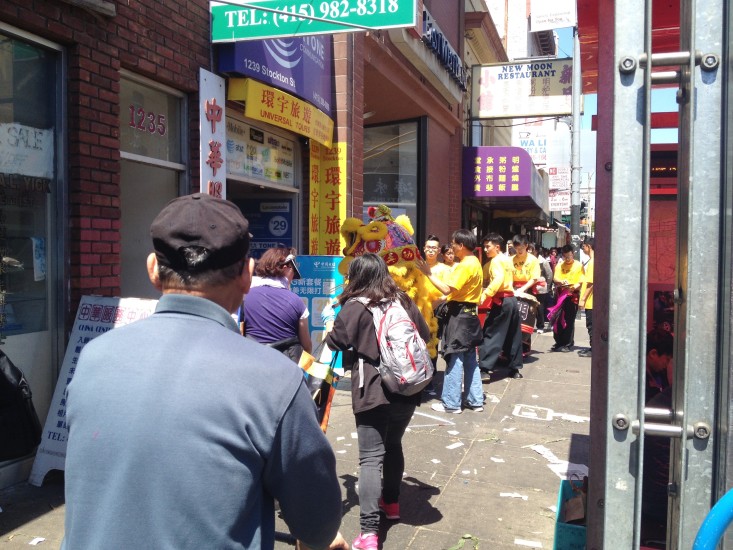
Lion dancing is the easiest way to sucker business owners into paying you.
The exceptions to this rule are the ubiquitous West Coast Chinatowns, the oldest and most authentic of which is located in the heart of San Francisco. This warren of lantern-lit alleyways is a place where Chinese criminal organizations roamed, maintaining their ancient code of silence, where oriental massage parlors and opium dens abounded, a place where after two rounds of “special liquor”, if oceangoing schooners still plied the Pacific, you would be fixin’ to get Shanghaied.
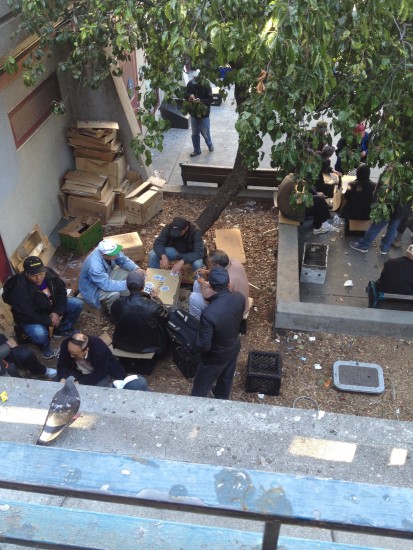
No idea what game this is, but it certainly gets played on a classy table.
By day, it is an absolute clusterfuck. While packed like a sardine on the tiny sidewalks, get prepared to be interrupted by a little old lady wearing a bucket hat and pulling a wire basket on wheels as she pauses to examine the fresh daikon laying in an outdoor stall with her timeworn eyes. Ready yourself to behold bloody carcasses of turtles, split in two and waiting for a buyer, and to be assaulted by the pungent, acrid, occasionally ammoniacal odors of strange roots used for traditional medicine, dried to an adamantine hardness and enveloped in a white dusting over their corrugated grooves, looking similar to how fresh snow coats a pinecone.
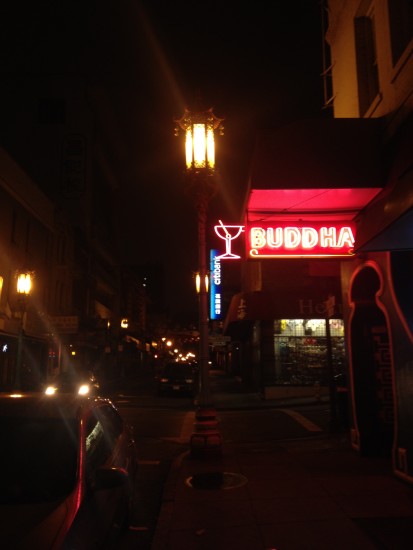
Buddha Bar, where you can play some Liar’s Dice
At night, on the other hand, the scene is completely different. The bustling crowds vanish by 7 pm, and the neighborhood is left with a few loitering stragglers as the streets take on a slightly romantic character. Chinese TV dramas blare through cracked windows with bras and underwear unabashedly hanging directly outside, line-drying in the cold air. Each alley has a middle-aged cook in a dirty apron, leaning against a wall, one hand in his pocket, and the other taking long drags of a cigarette which is half ash, the ruby cherry just slightly redder than the Chinese lantern barely illuminating the man’s face, up to which curl thick ringlets of smoke.
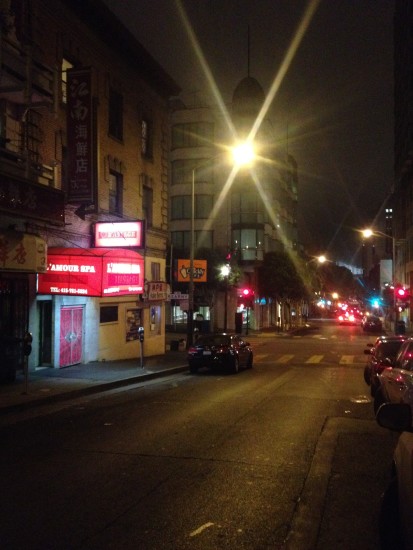
You’re not fooling anyone…you covered “massage” and you think we don’t know what’s going on?!
It was at this stage of Chinatown’s daily evolutionary cycle that I met Frank, over a steaming portion of his entrepreneurial cha siu bao. These little, doughy pork pockets were served piping hot from a cart that he would roll down from his apartment nearby, seeking out hungry drunks like a pig rummaging through underbrush for a truffle, the pay off being just as lucrative. While inebriated people, baby-faced yuppies and tobacco-laced Chinese grandpas alike, stuffed food clumsily into gaping maws, Frank and I struck up an odd friendship in the few nights that I was there. I soon became his impromptu business partner, hawking his dim sum like a carnival barker at a bacchanal.
Francesco “Frank” Wong was an enterprising, young gentleman. I could only assume that his parents really loved mafia movies, and he had clearly been inculcated with the determination of his long-forgotten, fictional namesake. He was not violent, and definitely not a bruiser, but he seemed hell-bent on success. He had attempted a variety of business ventures in the past, all slightly bizarre. First, he established a gif website back before people knew what gifs were, let alone argued over if the first letter is pronounced “j” or “g”. Next he took to mildly exploiting his native land and culture for profit, selling customized bowties which he ordered made for pennies by a sweatshop of oppressed drones working under a smiling portrait of Chairman Mao in Fujian province. And now the dim sum cart.
I’m no businessman, but from my observation, Frank’s latest enterprise was a success. Hordes of people would stop by, amazed at a semblance of choice in their late night fare, and this started to infuriate the little Mexican ladies selling bacon-wrapped hot dogs. It got to the point that we would take turns posted as lookouts should they come and try to eliminate the competition by alerting the police to our illegal food operation.
As for me, I reveled in the chance to chat up random passers by, and I was constantly pushing the boundaries of how I could close an ever more challenging sale. Once, a man was jogging by, and I yelled that he might want a bao to keep up his strength for the run. He stopped and bought three.
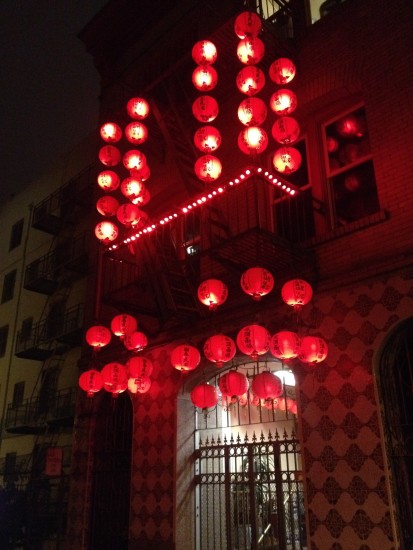
More than anything, I was impressed with Frank’s ambition. I saw him raking his meager profits into his left hand, cultivating a growing wad of cash. Every customer got a handshake with a suggestion that they follow his cart on social media. Oh, and he definitely mentioned he would inform his grandmother that so many people had enjoyed her food. I often imagined the smile on her face as she stood in her kitchen each afternoon, sticking together her perfect-looking dumplings and wiping her hands on her 1970s apron, happy that so many strangers would sleep comfortably with a full stomach due to her labor of love. She must have been cooking these buns for decades, as even the skillful ripples at the top were separated in uniform, microscopic lengths with an awe-inspiring, machine-like precision.
I met up on these nights a few more times with Frank. I got some free food and plenty of great conversation out of it. More than once, we even hid separate whiskey flasks behind the wheels of the steam cart, loosening our tongues to a point of unavoidable charisma and making selling out of buns a near certainty. Frank did, however, seem reluctant to illuminate me on various aspects of his life. I didn’t notice this at all until I asked how his grandma was doing, and was met with an awkward response. I figured he was just keeping his “employee” at a distance from his personal life.
Little did I know that all I needed was a promotion, to become a “made man” in Frank’s organization, which came on one of our last days together. Once Frank could have confidence in my omerta, I was finally allowed to be privy to the clandestine secrets of my new brotherhood. Ironically, he squealed faster than a stoolie turning state’s witness: Frank had no grandma, and bought his “homemade” buns in bulk at some shitty Chinese bakery for cheap. He actually lost money on the cart every weekend, and just sold food to drunk chicks because that was the easiest way to pick them up.
Lesson learned: The fastest way to a drunk girl’s heart is through her stomach. Also, make your grandma smile by asking her to make you something good to eat.
–Jerry (24), Austin, TX, running a bao racket with a wiseguy in Fog City
